
Muslims pray around the Kaaba, Islam’s holiest shrine, at the Grand Mosque complex in the Saudi city of Mecca, during the fasting month of Ramadan, on April 9, 2022. Saudi Arabia said today it will permit one million Muslims from inside and outside the country to participate in this year’s hajj, a sharp uptick after pandemic restrictions forced two years of drastically pared-down pilgrimages. (File photo by ABDEL GHANI BASHIR / Agence France-Presse)
ILIGAN CITY, Lanao del Norte, Philippines —Thousands of Muslim pilgrims bound for the yearly hajj, or pilgrimage to Mecca, have been stranded at Ninoy Aquino International Airport (NAIA) since June 19 because of the delay in the release of their passports or visas, which they expected on the day of their flight.
It was unclear how many were actually affected, but Marawi City Mayor Majul Gandamra said he was told by the National Commission on Muslim Filipinos (NCMF) that there were at least 3,500 stranded pilgrims from Lanao del Sur alone. About 2,200 had already left for Saudi Arabia.
NCMF Commissioner Yusoph Mando, the agency’s spokesperson, said on Wednesday that Secretary Guiling Mamondiong was engaged in talks with the airlines and the Saudi Arabian Embassy to help the stranded pilgrims.
Mamondiong is also trying to ask the Saudi Arabian government to provide an extra flight to accommodate the stranded pilgrims, but the matter will have to be decided by King Salman al Saud himself.
“[T]he commission wishes to apologize anew to the stranded ‘hujjaj’ (pilgrims) for their great distress after having been offloaded in their flights to Saudi Arabia,” Mando said in an advisory on Wednesday.
But Saudia Airlines informed the NCMF Bureau of Pilgrimage and Endowment that only 471 pilgrims were offloaded from their flights and 398 had already been rebooked for a flight on July 1. Thus, only 73 remained stranded.
There were 212 other pilgrims scheduled to take Qatar Airways who were also offloaded.
Maulana Mamutuk, a Marawi resident, said many pilgrims had been stranded at the airport since June 19, but some of them decided to return home because they had already run out of funds.
Lanao del Sur Representatives Zia Adiong and Yasser Balindong said in a joint statement on Tuesday that they would investigate the root cause of the mess once the 19th Congress opens.
The two congressmen said the pilgrims got into the situation because of a delay in the release of their passports.
The delays happened despite the electronic hajj (e-Hajj) registration implemented by the NCMF from Jan. 25 to Feb. 24 this year to help Filipinos going on the hajj.
The Department of Foreign Affairs also opened all its consular offices nationwide on May 21 to accommodate walk-in Muslim pilgrims and process their passports.
“Following the restrictions imposed in the last couple of years, many Muslim Filipinos have been looking forward to finally participating in the hajj this year,” the statement of the two lawmakers read.
RELATED STORIES
Congress should review hajj coordination program – Hataman